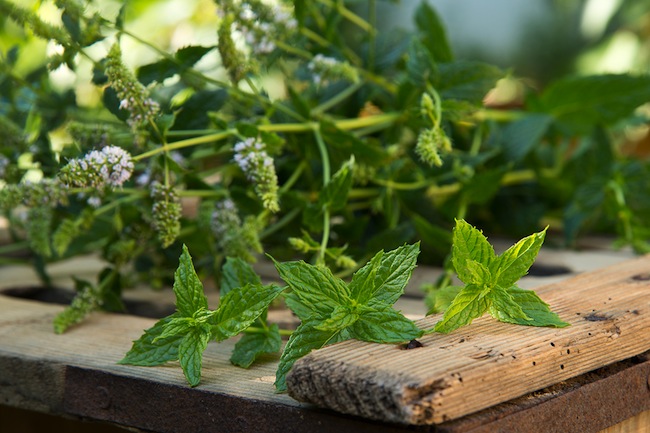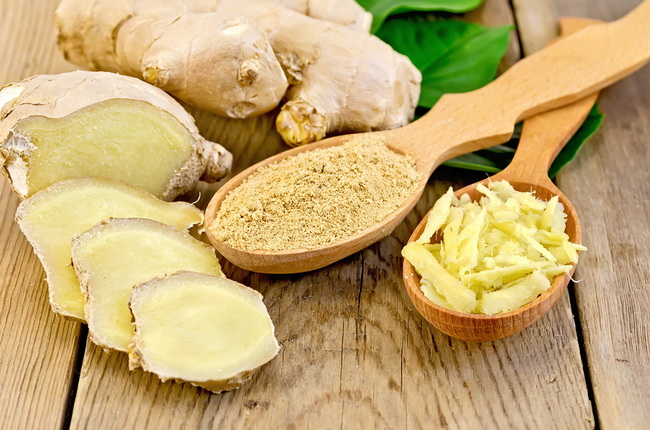- Make It Yourself Lavender Heart-Shaped Bath Bombs!
- 20 Things You Never Knew About “Down There”
- 12 Best Foods For Those Suffering From Arthritis Pain
- 12 Personal Hygiene Mistakes Almost Everyone Makes (Mom Never Told You About #4!)
- 15 Medicinal Plants And Herbs From The Cherokee People
- 12 Mind-Blowing Benefits Of Drinking Coconut Water During Pregnancy
- 12 Outstanding Winter Foods That Won’t Fatten You Up Like A Christmas Turkey
15 Natural Ways to Stop Migraine Headaches (We Love #9)

Photo credit: bigstock.com
One of the most disabling medical problems in the world is a migraine headache. This unbearable throbbing pain in the head gets worse with movement or light. For some people it can last as long as 72 hours. Although the symptoms vary from person to person, most people experience some type of warning sign in advance such as flashes of light, increased sensitivity to even the lightest sound or light, nausea, vomiting, and tingling in the arms and legs. Other signs can occur days before a migraine including a stiff neck, frequent yawning, constipation, and food cravings.
Although 75 percent of all migraine sufferers have a family history of this painful problem. It is unknown if it is actually inherited or not. This complex condition is thought to be caused by changes of chemicals in the brain.
There are plenty of well-known triggers for migraines including low blood sugar, hormonal fluctuations, certain smells, bright or flashing lights, dehydration, stress, allergies, smoking and alcohol. Not all of these events will trigger a migraine in every person but almost everyone who suffers from migraines knows what their triggers are.
Unfortunately, there are no known cures for migraines. The good news is that there are plenty of natural remedies that will get you the relief that you are looking for.
If you or someone you love suffers from migraines, you will definitely want to keep reading to find out the best ways to naturally stop migraine pain.
1. Fatty Fish
Believe it or not, migraine relief might be as close as your next fish dinner. Some studies have shown that eating fatty fish such as tuna, sardines, salmon, trout, and anchovies at least three times a week can increase your omega-3 fatty acid intake and lower your risk of developing a migraine.
2. Apple Cider Vinegar
Apple cider vinegar has plenty of health benefits to offer including detoxification, the regulation of blood pressure, encouraging weight loss, and reducing the frequency of migraine headaches. If you are not used to taking apple cider vinegar, begin by consuming one teaspoon each day and gradually increase this amount until you are consuming one tablespoon. Add your apple cider vinegar to a glass of water and a bit of honey to make it more palatable. Drink this daily. If you feel a migraine coming on, you can always drink another glass to help reduce the pain.
3. CoQ10
The medical journal Cephalalgia Arch published a study which showed that the coenzyme Q10, often referred to as simply CoQ10, was an effective remedy for the prevention of migraine headaches. Perhaps the best part of this study was that there appeared to be absolutely no side effects. Take according to directions.
Continue to Page 2

Photo credit: bigstock.com
4. Peppermint
Peppermint is a natural anti-inflammatory that helps soothe the nerves. It also is a natural antispasmodic. The International Journal of Neuroscience published a study in 2008 which found that just smelling this herb created feelings associated with headache relief. Drink one or two cups of peppermint tea sweetened with honey each day and at the very first sign that you might be coming down with a migraine. You can also massage your temples with one drop of peppermint essential oil for 20 minutes when you first feel the migraine start.
5. Butterbur
Butterbur has been used for hundreds of years to stop pain and lower fevers. Today, butterbur is widely recommended to prevent migraines. Butterbur has powerful anti-inflammatory compounds that can ease headaches, even migraine pain. Always choose a quality brand from a company with a good reputation as cheaper imports have been shown to contain pesticides or, in some cases, no actual butterbur at all.
6. Cayenne Pepper
It might seem strange how something so hot can ease migraine pain but that is exactly why this works. Cayenne pepper stimulates and increases circulation, as well as containing capsaicin, a substance that is a well-known painkiller. You can simply mix one half teaspoon of cayenne pepper into your favorite herbal tea and drink at the first sign of a migraine.
Continue to Page 3

Photo credit: bigstock.com
7. Vitamin B2
Vitamin B2, otherwise known as riboflavin, has been shown to dramatically reduce the frequency of migraine headaches. The medical journal Neurology published a study in 1998 which showed that when 55 subjects consumed 400mg of B2 each day over a three month period, they cut their migraine attacks in half. Try it for yourself and see. B vitamins work best in combination with each other, so try taking a B vitamin complex supplement that contains at least 400mg of vitamin B2. You could start seeing results in as little as 60 days!
8. Chamomile
You might think that chamomile is a great tea to drink when you need a little help falling asleep, but chamomile has potent anti-inflammatory, antispasmodic compounds that can relieve migraine headaches. Regular consumption of chamomile tea can even prevent migraines from developing. The best results seem to come from German chamomile so choose your tea carefully and drink two or three cups each day for best results.
9. Cannabis
This is actually a traditional migraine remedy that got kicked to the wayside in the 1930’s. This substance might be illegal in your area but if you can legally purchase medical marijuana or if it is legal in your area, speak to your doctor about how to safely use this natural herb for almost immediate pain relief and prevention of migraines. How sweet it is!
Continue to Page 4

Photo credit: bigstock.com
10. Ginger
Ginger tea is a great way to stop the pain from migraine headaches. Ginger blocks prostaglandins, which are compounds that encourage muscle contractions and regulate inflammation in the blood vessels of the brain. In fact, most of the non-steroidal anti-inflammatory drugs work the same way, by reducing the production of these types of chemicals. One study published in 2013 in the journal Phytotherapy Research showed that ginger had a very positive effect in the treatment of everyday migraines. Drink ginger tea at the very first sign of a migraine and continue until the pain subsides.
11. Magnesium
This is perhaps one of the best supplements you can start with because magnesium relaxes the blood vessels in the brain, which can sometimes stop a migraine before it starts. Try taking 500mg of magnesium each day for prevention of migraines and 1500mg at the first sign of a migraine.
12. Feverfew
Like butterbur, feverfew is another remedy for headache pain and fever that has been used for centuries. Feverfew contains a compound called parthenolide, which relieves muscle spasms and prevents inflammation. This herb also reduces pain by inhibiting the production of prostaglandins, which influence pain signals. You can take 100mg of a feverfew supplement each day or drink a few cups of feverfew tea at the first sign of pain.
Continue to Page 5

Photo credit: bigstock.com
13. Ice Pack
This ancient home remedy seems too simple to actually work, but its numbing effect can ease tension and stop pain, sometimes within minutes. Simply wrap a few ice cubes or an ice pack in a clean towel and apply it to your forehead, temples, or the back of the neck for 10 to 15 minutes. Leave off for another 10 minutes, and then reapply as needed.
14. Massage
Massaging the head stimulates serotonin receptors, which can reduce the symptoms, as well as the frequency of migraines. Massage can also ease migraine pain by blocking pain signals sent to the brain. If you think this sounds too simple, the Annals of Behavioral Medicine published a study in 2006 which showed that massage therapy was very helpful in the treatment of migraine headaches. Simply massage your head with your index and middle fingers in a circular motion. You can also warm about 2 tablespoons of sesame oil mixed with half a teaspoon of cardamom and cinnamon. Massage this mixture into your forehead and temples for 5 to 10 minutes. Allow it to soak in for a few hours before you wash it off.
15. Apples
At the very first sign of migraine pain, eating an apple can help to reduce the pain as well as the length of the episode. Research suggests that even just smelling a green apple can reduce the severity of the pain, especially for those who enjoy the smell of green apples. Scientists aren’t sure why this method works, but for some people, an apple a day keeps the migraine away.
There are plenty of no-no’s for those who get migraines and you should avoid the following:
- Salty foods
- Citrus fruits
- Onions
- Caffeine
- Soy
- Chocolate
- Aged cheeses
- Red wine
- MSG
- Smoked foods
- Fermented foods such as pickles or olives
- Sourdough bread
- Gum
- Tomatoes
Know your triggers and avoiding them is sometimes the best remedy. Stopping a headache before it begins is the best remedy of all.
References:
































